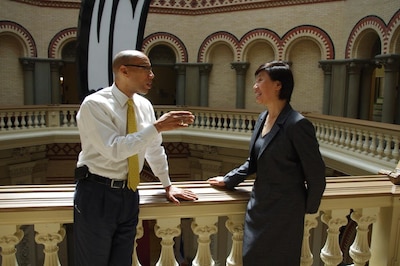
A longtime educator who began her career teaching girls in jail has been named acting principal at the city’s most selective high school.
Jie Zhang, who led a different elite high school for five years, will be interim acting principal at Stuyvesant High School, Chancellor Dennis Walcott announced today. She replaces Stanley Teitel, the school’s 11-year principal, who announced his retirement last week amid an investigation into a cheating scandal at the school.
“We are fortunate to have tremendous leaders and talented teachers like Jie Zhang in New York City public schools, and we are thrilled to have her join the Stuyvesant High School community,” Walcott said in a statement.
Zhang is not actually new to Stuyvesant: She has been a parent there since 2005, when her older child enrolled, and last year she headed the Department of Education “network” that Teitel selected to support the school. Her daughter is a junior.
The cheating scandal that erupted in June implicated more than 70 students, giving rise to criticism that Stuyvesant’s cutthroat environment encourages students to take shortcuts to success. But in a phone call with reporters today, Zhang said she did not learn about widespread cheating at Stuyvesant as either a parent or an administrator. Still, she said, improving the school’s “culture” so that cheating does not take place is her first goal.
“I have not been made aware … or have a reason to believe that there is ongoing cheating there,” Zhang said. “However, my top priority is to create a positive school culture that ensures integrity and zero tolerance for cheating.”
An investigation is ongoing into whether administrators at Stuyvesant followed the proper procedures after learning about the cheating. Department officials declined to say whether network officials had been interviewed by investigators, saying that the department never comments on open investigations.
And explaining that she has not been offered the slot permanently, Zhang declined to outline any specific plans for the school. But she said its “academic offerings could be looked into to be able to meet the needs of individual students.” She also pointed to the expansion of advanced courses and research programs under her leadership at the Queens High School for Sciences at York College as some ideas she might consider for Stuyvesant.
She also said she would work to foster racial diversity at Stuyvesant, which has been criticized for not serving students of all races equitably. Citywide, 72 percent of students are black and Latino, but at Stuyvesant, it’s Asian students who make up 72 percent of enrollment. Just 4 percent of Stuyvesant students are black and Latino, although those numbers could edge up this year.
“I’m for the idea of diversity,” said Zhang, who would be Stuyvesant’s first Asian principal. “We live in New York City where diversity is the key. I’m definitely going to promote the idea of diversity.”
Zhang was born in China and moved to New York to get a master’s degree in applied mathematics. She began working in city schools in 1988 as a teacher at a girls’ school on Riker’s Island. She became a math teacher at Forest Hills High School, a large and high-performing school in Queens, in 1993, then spent two years as its assistant principal for mathematics.
After a stint helping middle and high schools with math instruction, she took over Queens High School for the Sciences at York College, one of several specialized high schools opened under the Bloomberg administration. Last year, she left to work as a network leader to more than 30 schools, including Stuyvesant.
Zhang’s resume makes her an ideal pick to lead Stuyvesant, principals union president Ernest Logan said in a statement.
“Jie has exactly the right combination of outstanding academic and administrative experience to allow her to maintain the stability and standard of achievement for which Stuyvesant High School has always been famous,” Logan said.
Zhang said she hopes to become the school’s permanent principal after the city’s required appointment process is completed this fall. That process, known as C-30, requires sign-off from a committee that includes parents and teachers, some of whom are already familiar with Zhang.
“I know that she is a math person and I know that there are math teachers at Stuy who know her well and who think very highly of her,” said Mike Zamansky, the school’s longtime computer science teacher. “My experiences with her have been very good.”
And Zhang’s experiences with the school have been good, too. After leaving Stuyvesant, her son graduated in three years from Harvard University, where he studied physics, math, and computer science, she said. This fall, he is set to begin graduate work in computer science at Carnegie Mellon University.
How much does Zhang credit Stuyvesant for her son’s success? “Ninety-nine percent!” she said. “I get the 1 percent.”
This story has been corrected to characterize correctly the statement issued by principals union president Ernest Logan.
